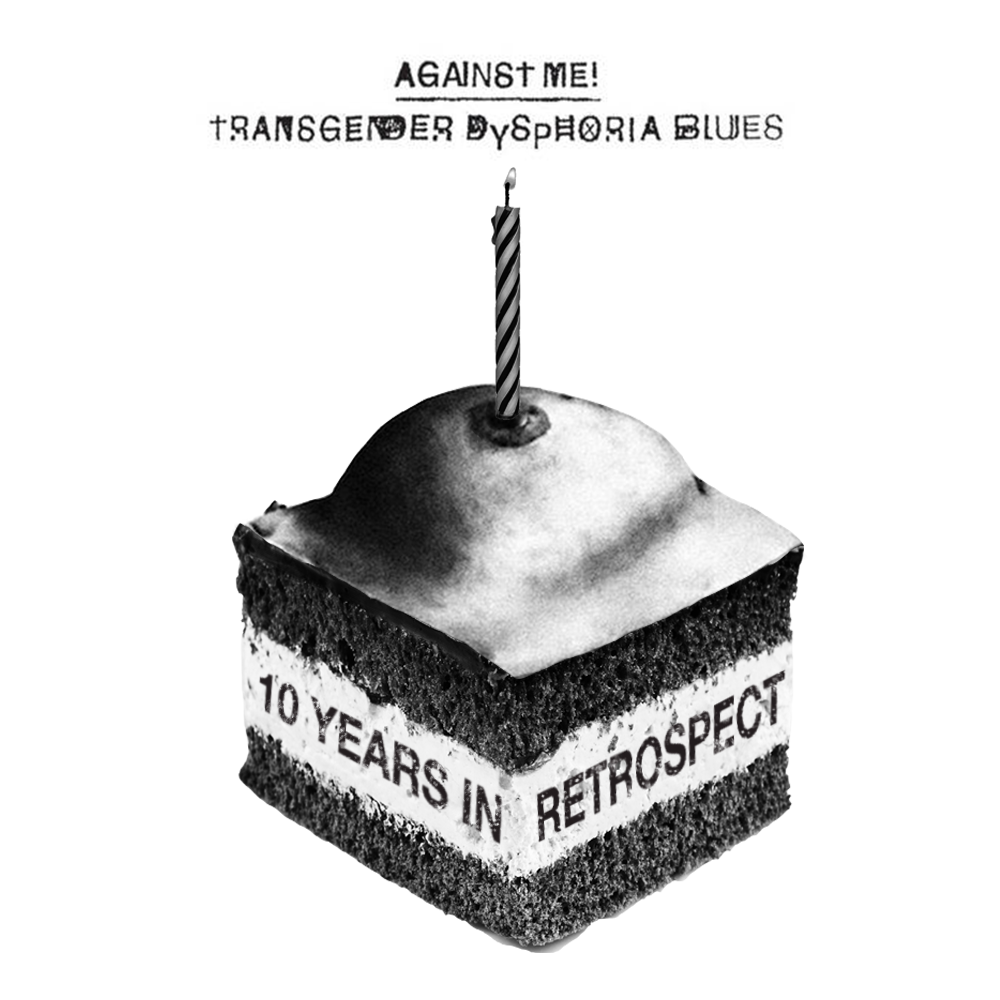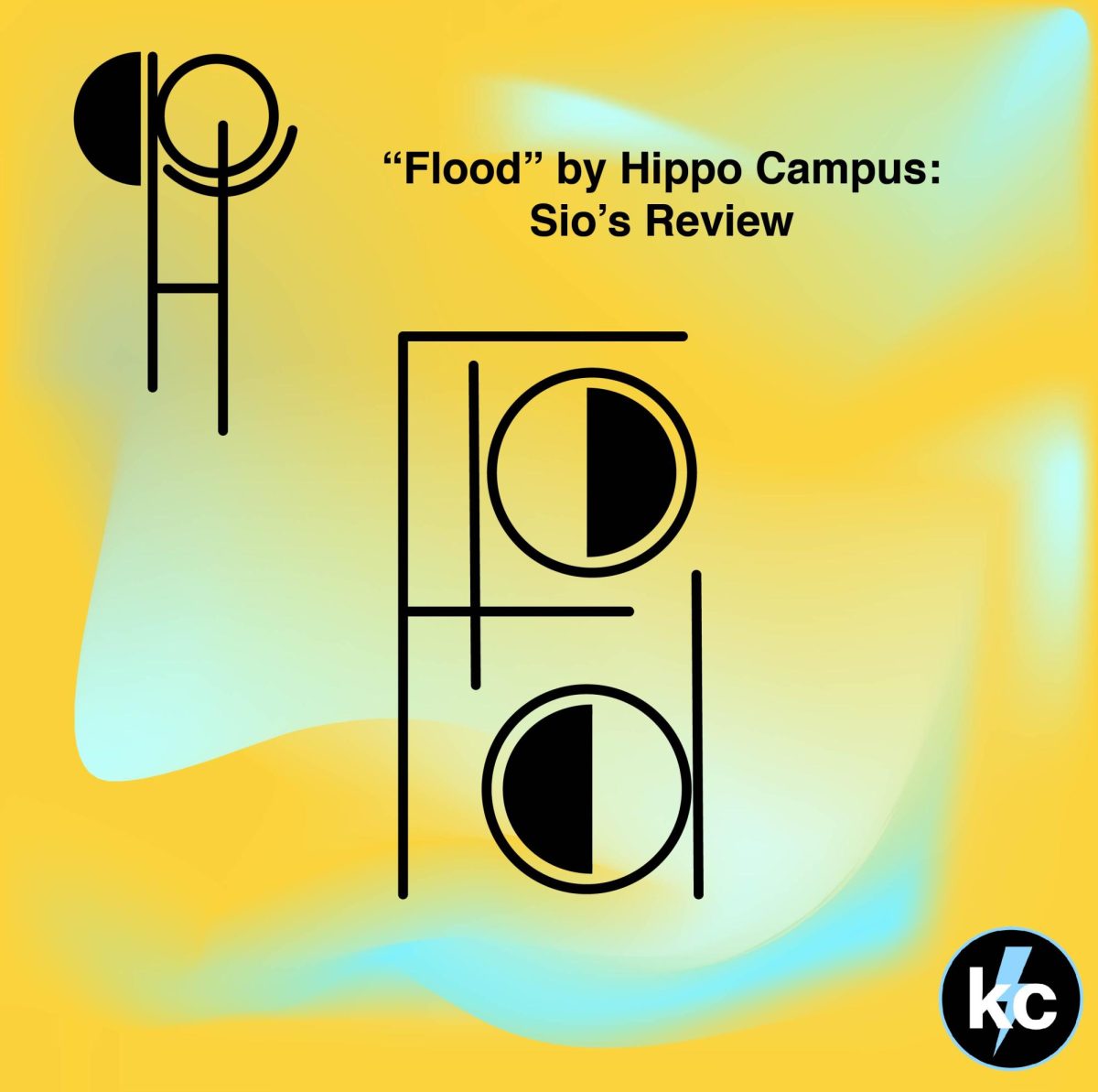There’s not much to say about “Transgender Dysphoria Blues” that hasn’t been said before. Eight months after the ten-year anniversary of the album, every music publication in America has written their own think-piece about how this album changed lives. Yet, this manages to barely scratch the surface of Against Me!’s impact.
In the beginning days, Against Me! felt almost prophetic. The project formed from front-woman Laura Jane Grace’s childhood fascination with hair metal musicians: they were mythical, untouchable, and androgynous. Grace revered these aesthetics in a somewhat surface-level way, until she faced her first act of police violence as a teen, and sought to create something real, tangible, and angry. Flipping the score, taking this inspiration as her own, she wrote “Against Me! Is Reinventing Axl Rose,” released in 2002.
Ten years of a whirlwind career later, from punk squats to stadium tours, Grace was suffering. Coming to a head with Against Me! being dropped from their label, being sued by their ex-manager, a new child, a failing marriage, an increase in drug use, and constant, crushing dysphoria, it was clear: Laura Jane Grace must come out as transgender. But as one of the mainstays in the boys club that was rock music at the time, this was no easy feat.
In 2012, Laura Jane Grace came out in a Rolling Stone exclusive interview She was the public face of trans people in music before she had even begun transition. It’s a tragedy that Grace was forced to transition so prominently in the public’s eye. In her autobiography “Tranny,” she writes about the pressure of the whole world watching her begin her journey. While young trans people were approaching Grace at shows thanking her for giving them the courage to begin their own transition journey, Grace wrote that for a short period, it felt like transition was the opposite of what she needed. The stress of her personal life and public spotlight while she was still figuring out what her transition looked like made her want to yell at those kids to turn back from transitioning while they still could.
Looking back, it feels outrageous that Grace’s coming out was via a personal and vulnerable interview with Rolling Stone, before she began socially or medically transitioning. The article features an almost embarrassing amount of detail about Grace’s awkwardness and uncertainty, and some frankly odd (in retrospect, that is) comments from her at-the-time wife Heather Gabel about the couples’ sex life and masturbation habits. While of course Grace and Gabel were the ones providing the quotes, and neither have publicly voiced discontent with the contents of the article, it’s sad and strange looking back that such personal details had to be spelled out in order to be understood by the public. While today trans people are certainly expected to share more of their personal lives than should be standard, compared to eight years later when even more prominent Elliot Page was able to come out with just a simple press release on social media, it shows how far the way we view transgender people has changed.
It’s almost impossible to talk about the waves of shock Grace’s announcement of transition caused because the social landscape is just so different today. At the time, that Rolling Stone article was one of the first detailed pieces of mainstream media transgender people could point at to explain to others what they were feeling. Laura Jane Grace’s transition feels like a clear departure from the “open secret” kind of queerness of the past. Prominent queer artists like Freddie Mercury were able to live through on-stage personas, backtrack on their statements, and dance around the wording. Grace’s coming out was different. The underground nature of transness, the scene she was in (punk inherently requires authenticity), and the highly visual nature of her impending transition, meant in order to live her truth, she had no choice other than to get detailed.
In a way, Grace’s coming out feels like the precursor to the intertwinement of music with identity labels. While exhaustive personal details might not be the norm for queer artists anymore, there still comes the expectation of a certain willingness to admit the details of your identity if you write about any topic that might be seen as queer. In contrast, Grace was able to hide through her writing in a way. From alluding to crossdressing in “Total Clarity”, the initial pitch of “Transgender Dysphoria Blues” as a concept album about a transgender prostitute, to straight-up opining “And If I could have chosen, I would have been born a woman/My mother once told me she would have named me Laura” in “New Wave’s” track “The Ocean”, these themes have always been hidden in Grace’s work. In the modern age, the idea of “being an egg” is so known in online queer circles that it is almost certain Grace would have dropped these lyrics or been pressured into coming out sooner.
Two years after the landmark Rolling Stone article, Against Me! released their first album after Grace’s public transition. Personally as well as professionally, it’s very clear that “Transgender Dysphoria Blues” was always destined to be a kind of rallying cry for the band. After the criminally commercial failure of “White Crosses” and the confusion surrounding Grace’s transition, this album was make or break for the band – and it was nearly break. In the process of writing and recording the album, Against Me! lost all of its core membership aside from Grace, and a storm caused a tree to collapse onto their burgeoning indie record label’s studio which forced her to re-record the album three separate times. When Grace came out, the Rolling Stone headline on the cover of the magazine was “The Secret Life of the Rock Star Who Became a Woman”, as if “rock star” and “woman” couldn’t coexist. Many people thought Grace’s transition simply meant an end to her music career. With all of this combined, there was much on the line for Against Me!, and all eyes were on them for the release of “Transgender Dysphoria Blues.”
While past Against Me! albums soaked these themes of transness into hidden cracks, “Transgender Dysphoria Blues” brings a kind of curtness different from Laura’s typical writing. Compare “Dead Friend” to 2011’s “Because of the Shame. Grace’s “Tranny” revealed just how much of Against Me!’s lyrics were taken directly from Grace’s personal journals, leading to beautiful, personal, and endearingly-clunky bars layered over moving guitar riffs. I find this most impactful in “Because of the Shame”’s chorus especially: it speaks to Grace’s strengths as a writer that this elegantly constructed verse was just a first draft plucked from a diary. Despite having a significantly longer writing period than other Against Me! albums, “Transgender Dysphoria Blues” lacks a lot of the metaphor of previous releases, and benefits from it. While “Because of the Shame” includes brief mentions of caskets and burying, “Dead Friend” says it clearly: “Goddamn I miss my dead friend.” With simpler words found in the refrain of “Oh your cold dead hands/Oh your cold dead lips,” the song instead finds its emotional footing not even in the complexity of the backing track, but in the power and way in which the message is delivered. At times, it feels as if Grace is scrambling to get the ideas out of her head while she still can. “Drinking with the Jocks,” one of my favorites on the album, is a raging, almost grief-filled declaration that she was not one of the macho rockstars she had fit in for so long: “All of my life, all of my life/Just like I was one of them”. The record is a clear catharsis. While in the past she was able to hide herself behind lyrics like in “The Ocean,” “Transgender Dysphoria Blues” feels like a rush to get the message into the world in a kind of beautiful rawness.
Though the album is lauded for its strength and power through anthems like the title track “Transgender Dysphoria Blues” and “True Trans Soul Rebel,” to me, it is strongest when viewed as an expression of fear. Even songs seemingly unrelated to transness like “Unconditional Love” reflect that early rockiness of transition, where nothing can be thought about without considering the impact of your transness. “Osama Bin Laden as the Crucified Christ” compares the persecution of divisive political figures in the media to the violence trans women face, and the fear of the kind of martyrdom that comes with it. “Two Coffins” is about the fear of losing a child (both from the passage of time and, as detailed somewhat in “Tranny,” due to the social pressures of transition). To me, the most impacting, “Paralytic States” appears to be a remnant of that concept album about a transgender prostitute Grace intended to write all that while ago. The narrative is compelling enough within the context of the song itself, but it gains even more meaning when considering how it was likely written as an outlet during the time when Grace admittedly only saw representation of women like herself in media as victims: “Paralytic states of dependency/All waking life’s just a living dream/Agitated states of amazement/Never quite the woman that she wanted to be.”
All bets were wagered on the success of “Transgender Dysphoria Blues,” and it paid off. The album is remembered both for its strength as a punk album as well as its boldness in its queer messaging. The success of this album represents the acceptance of Against Me! as a household name. The commercial success (and applause for that success) of the record comes from a stark contrast to Against Me!’s early work. Grace writes of the time after signing the band to their first record label, when punks would come to their shows just to sneer at them for “giving up on their morals” by choosing to make money from the project. In one instance, this ended in a physical altercation. But when it came time for “Transgender Dysphoria Blues,” this energy was not found. Whether it was from reverence for Grace’s willingness to become a visible icon for the transgender community, a mark of the beginning of the shift away from resistance to “selling out” and an embracing of today’s age of “hustle culture”, or even an admission that the band has finally “made it” and they had sold out long ago, this criticism was not found with the release of “Transgender Dysphoria Blues.”
Where are we now? Everywhere and nowhere. While Laura Jane Grace’s coming out was a monumental step towards visibility for the transgender community, in a way, we are almost too visible today. In sharp contrast to the time of Grace’s early transition, trans people are all over the news, and not often in a positive light. I regard her early admiration of Axl Rose as prophetic because, in a way, Laura Jane Grace has become the kind of untouchable rock star that she began Against Me! to try and destroy. This is not to say that her public success has been unwarranted, rather, I simply invite you to revisit Against Me!’s catalog. For all of the warranted praise and accolades Grace has received for the album, in recent times, I see very few engage publicly with the themes of the record. Grace is still an active musician: it looks nothing like her days of opening for Mastodon and Green Day, but it is instead a return to the values of anarchy and political expression she began playing music for. Now, she’s playing solo shows to rooms of fifty-some-odd weirdos. But, as it appears: she’s happy. In an age where trans identity is highly publicized but often misconstrued, a raw expression like “Transgender Dysphoria Blues” is something we can all learn from. Ten years on, the world is entirely different than it was when “Transgender Dysphoria Blues” was released, but its values should never be forgotten.
Does god bless your transsexual heart?
Flash warning








